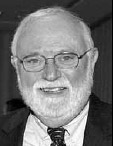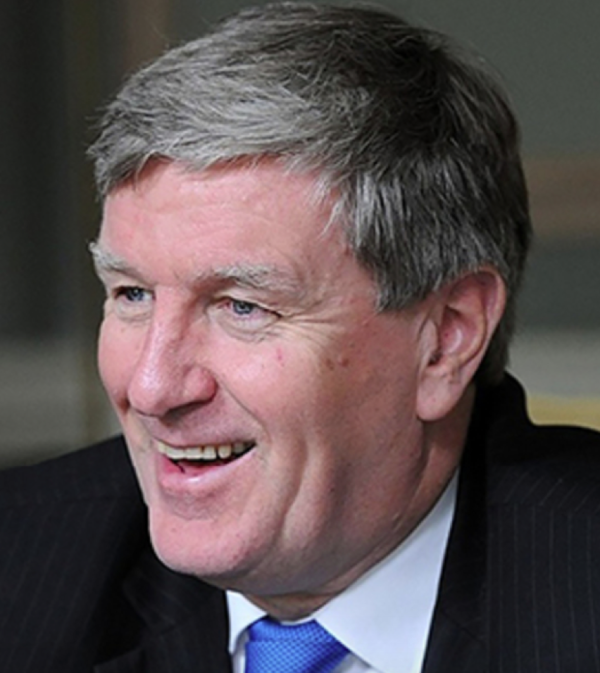
November 30, 2021

Dan Mulhall, Ireland's Ambassador to the US, has authored a book, ‘Ulysses: A Reader’s Odyssey’ celebrating the 100th anniversary of James Joyce's "Ulysses". It will be published in January, 2022
by Ed Forry
Boston Irish Publisher
Daniel Mulhall became Ireland's 18th Ambassador to the US in August 2017. A native of Co. Waterford, he holds degrees in modern Irish history from University College Cork. He is a 43-year veteran of Ireland’s Dept of Foreign Affairs, and has served in New Delhi, Vienna, Edinburgh, Malaysia, and Germany. Before coming to Washington, he was Ireland's Ambassador in London, and a regular speaker on political, literary, and historical topics at Universities all over the UK.
Mulhall has written 'Ulysses: A Reader's Odyssey", described as an “exciting and accessible guide to Joyce’s masterpiece, “Ulysses,” according to advance publicity from the publisher New Ireland Books, which notes that it will be launched next month.
“Mulhall will carefully navigate the general reader through Ireland’s most famous work of fiction. … Dan Mulhall untangles “Ulysses” from its infamous reputation of impenetrability. This is a guide for the lay person, an initiation into the pleasures and wonders of Joyce’s writing and of the world that inspired it.”
The ambassador spoke with Boston Irish publisher Ed Forry on Nov. 8 at Greenhills Irish Bakery in Dorchester.
Q. What was your motivation in writing this book
A. Well, I decided a few years ago, having seen in American universities and libraries, so many copies of James Joyce's “Ulysses” (the original was published in 1922), I thought it would be a good idea for the centenary of the novel in February of 2022 to do a blog. I blogged on each episode of the novel, and, of course, I thought I wouldn't finish this blog for probably for years. But then the pandemic came and I had a little more time in the evenings and I wasn't doing anything socially. I finished the blog late last year, decided I’d turn it into a book, and New Ireland Books agreed to publish it.
Q. How did you structure the blog?-
A. It was a series- there were 18 episodes to “Ulysses” and I have one blog on each episode. Now, when I was preparing the book for publication, I rewrote all the blogs. So the blogs are there, but they don't bear much of a resemblance to the final product because I doubled the size of each chapter. I did a lot of extra work to get the blog ready for publication as a book. So it's a very different book from what’s in the blog.
Q. Does your interest in Irish literature goes beyond Joyce
A. I am honorary president of the Yeats Society at the moment. Look, the background to this is that early in my career, I discovered that our literature is a real asset for Ireland, in that people all over the world know about Ireland. Even if they have no ancestral connection with our country, even if they've never been there, they often know about it because of our literature, in particular, W B Yeats, James Joyce, Sean O’Casey, Samuel Beckett, Seamus Heaney in more recent times, and many other writers as well.
So I decided early on that I should use our literature as a way of telling Ireland’s story. And I've done that for 40 years now, all over the world. I tend to use Yeats more than Joyce, because Yeats is more accessible. His poetry is more readily relatable to; Joyce's work is a little more complicated, a little more forbidding in many ways.
Q. How do you view James Joyce’s work
A. “Ulysses” has a reputation for being forbidding, for being impenetrable. And I decided after long years of talking about Joyce around the world, that that wasn't quite true. And I decided to use my book to prove that it actually isn’t true, that
this is a book you can read and understand and can benefit from reading.
Q. What techniques did you apply in discussing “Ulysses”?
A. I've done things in my book that academics won’t approve of, but I do. For example, in a number of places, I say if you find this chapter difficult, skip it, don't get bogged down in it. For most people who start the book, the first episode is very easy to understand. So is the second episode. And the third one kills them because it all takes place within the mind of Stephen Dedalus, Joyce's alter ego, walking down a beach in Sandymount, and it's difficult.
Now, you can enjoy it, and I say to people read through it, but don't be put off by it. If you find it difficult, just move through, just skip off, go to the next chapter because chapter four is a very good read. So is chapter five. So is chapter six. Chapter seven is difficult, I think, and then it gets easier again. And then the last five chapters are very difficult.
Q. Did you come to your interest in Irish literature with a background as an English major?
A. More of the history, I mean as an English and history major. But in fact, if I had to describe my approach to “Ulysses,” it would be “Ulysses” as part of Irish history, because I focus very heavily on the history that is embedded in the novel.
Most people don't recognize the fact that Joyce himself was actually fascinated with the minutiae of Irish politics at the beginning of the 20th century, His father was a great supporter of Charles Stuart Parnell. He, too, was an admirer of Parnell. He was also an admirer of Arthur Griffith, who was the founder of the original Sinn Fein party, very different from the party that came into being after the rising of 1916, and very different from today’s party.
But nonetheless, Joyce was intensely interested in the history of Ireland and that history comes out throughout the novel; there are constant references to things that were happening in Ireland at that time and to the history of Ireland.
For me at least, Irish history is a good avenue from which to approach the complexities of “Ulysses.” And that's what my book tries to do is to bring out the historical elements of it. It’s the hundredth anniversary of the publication in 1922 on the 2nd of next of February, and it was published on Joyce's 40th birthday. He was superstitious. So, he wanted the book to be published on his birthday. And, indeed, the first copies of the book came off the printing press and he acquired a copy of it on his 40th birthday.
So, I’m hoping my book will be helpful to people; I've tried to make it an easy read. So even if you don't read “Ulysses,” I feel that reading my book will give people a fairly good idea of what the novel is all about.
Q. Do you plan to give some lectures in this upcoming 100th anniversary year?
A. I've always done this anyway. I've always been willing to give lectures on Yeats and Joyce, and I'll continue to do that. I will do a few book events over the next number of months, once the book comes out, and I'm hoping that it will attract a readership, both in Ireland, but also in America where I think a lot of people will be interested in at least dipping into “Ulysses.”
They may not read the whole book and I don't criticize people if you skip through it. I say to people, if you don't feel like reading the whole thing, read the 1st chapter, read the 12th chapter and read the 18th chapter. … The first chapter introduces you to Stephen Dedalus, one of the three main characters. The 12th chapter introduces and features Leopold Bloom, and many other characters as well. And it's a very lively chapter, really well written and beautifully done, and very interesting and very good dialogue and so on. And then the 18th chapter gives you Molly Bloom. I would say maybe I would go for that sequence.
Q. English majors across the world are going to be very indebted to you.
A. Well, I would say I think my book is accessible. I don't think anybody will read it and be put off by it, because there is no reference to any literary theory, for example, none at all.
I do quote some academics when I found it helpful, but most of the academic work I’ve read on “Ulysses” is actually not helpful to the general reader, because it tends to make things more complicated rather than simplified.
What I tried to do is to quote some of what I regard as the choice passages from the book. So that if you read my book, you'll probably get a whole bunch of quotations, which will give you a good idea of flavor of “Ulysses.”

